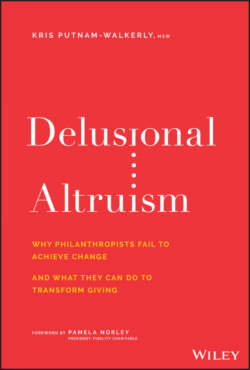Читать книгу Delusional Altruism - Kris Putnam-Walkerly - Страница 23
2 You Are Fearful
ОглавлениеI recently spoke to the CEO of a foundation association who wanted to refresh the association's strategic plan. He wanted to start with a “learning tour,” on which staff and board members would travel to multiple cities, set up town hall meetings in each, invite funders to attend, and engage in an orchestrated conversation to “learn” in order to inform the strategic plan. I told him he suffered from a scarcity mentality and was wasting time and resources. As you can imagine, he was shocked.
I explained that between his many talented staff, his seasoned board members who represented their entire geographic footprint, research they recently commissioned, and his team's collective learning from attending conferences and talking with members, they already knew 80% of what they needed to know. There were much faster and cheaper ways to gain that missing 20% than spending six months on a “learning tour.”
The leadership of this organization suffered from a scarcity mentality because of fear. They didn't trust their own talent. They lacked confidence that they already had most of the knowledge they needed, or that they could quickly gain the rest. They didn't regularly invest time in their own organizational learning to capture and use this knowledge. As a result, they were willing to spend a lot of time and money on the wrong things (the learning tour)—and were willing to hurt themselves by postponing strategy development as a result. They were delusional in their altruism. They thought they were doing the right thing, but they were just getting in their own way.
Fear manifests itself in myriad ways in philanthropy. And it causes loads of problems. Fear wastes money, time, and talent. It prevents you from learning and improving. It results in less impact. And it's no fun! Who wants to be fearful?
Let's talk about some of the most common ways we experience fear in philanthropy. As you read these examples, think about the many ways fear holds funders back and how this contributes to a scarcity mentality. It might result in funders giving less, investing less in their own growth and development, or not openly sharing what they are doing and learning.
